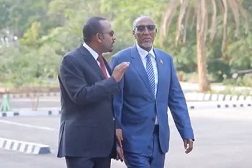Under the title: “Misinterpreted Promises and Deceptive Tactics: The Somaliland-Ethiopia MOU Fallout”, Andargachew Tsege, a major opposition political figure in Ethiopia who was from Prison by Prime Minister Abiy Ahmed, explains the Ethiopia, Somaliland recognition, naval base deal in this article. The signing of the Memorandum of Understanding (MOU 01/01/24) between Somaliland and Ethiopia took many by surprise. It was sudden and dramatic.
The world interpreted the MOU’s significance as Ethiopia’s commitment to recognize Somaliland’s sovereignty in exchange for access to a coastline along the Gulf of Arabia. This coastal access was emphasized, underlining Ethiopia’s potential for economic and naval utilization. President Muse of Somaliland was explicit in his remarks, conveying through translated Somali words that Ethiopia would acknowledge Somaliland as a sovereign nation.
However, a sense of discomfort was apparent on PM Abiy Ahmed’s face as the Somaliland president joyfully announced securing Ethiopia’s recognition for his nation at the joint press conference. Subsequent developments, especially this morning’s (03/01/2024) state communication’s press release, shed light on the tension at the joint press conference. Abiy was aware that what the Somaliland President believed to be true was inaccurate and was also clear of the chaotic reactions that would follow President Muse’s pronouncements.
The reaction was undeniably chaotic and far-reaching. For Abiy Ahmed, aiming to generate considerable attention, the extent of the reaction must have been immensely satisfying. Ethiopia had, in fact, only pledged to review Somaliland’s request for recognition, a stark contrast to the Somaliland president’s interpretation.
The Somaliland Government urges all concerned parties to respect the MoU between the Republic of Somaliland and the Federal Democratic Republic of Ethiopiahttps://t.co/gvmcbHwOJS
— MFA Somaliland (@somalilandmfa) January 3, 2024
In Addis Ababa and Hargeisa, both leaders sought to leverage the MOU signing for their respective advantages. President Musa, unaware of Abiy’s deceptive nature, genuinely believed Ethiopia’s imminent recognition and encouraged his people to celebrate the prospect of joining the international community as equals among nations. Meanwhile, in Addis Ababa, Abiy, cognizant of the deal’s lack of novelty or significance, spun a narrative beyond belief to divert attention from his faltering regime.
Why then do we assert that the MOU contained nothing extraordinary? The government of Abiy had to deploy its propaganda machinery at full throttle, flooding the streets with honking party cadres’ cars and ululations from street-sweeping women. It’s noteworthy that many countries with extensive coastlines struggle to capitalize on them for generating wealth, making the arrangement of leasing coastal lines mutually beneficial.
Crucially, this arrangement does not constitute a permanent cession of territory from Somaliland to Ethiopia. Instead, it signifies an agreement facilitated by Somaliland, where the land between the coast and the Ethiopian border falls under Somaliland’s jurisdiction. This contradicts Abiy Ahmed’s narrative of Ethiopia’s natural border extending to the sea, particularly the Red Sea.
MOU for Partnership and Cooperation has been signed between the Federal Democratic Republic of Ethiopia and Somaliland. The MOU includes scopes of cooperation in social, economic, political and military fields.
full statement below#Ethiopia 🇪🇹#PMOEthiopia pic.twitter.com/0CcGDzLiuh
— FDRE Government Communication Service (@FdreService) January 3, 2024
The agreement doesn’t involve Ethiopia claiming someone else’s coastline but rather gaining access to a seacoast under Somaliland’s governance. The economic benefits accruing to Somaliland from leasing their idle coastline could be seen as an unexpected windfall. However, despite this, the complete fruition of the agreement is yet to be witnessed, especially in light of the recent disclosure of deception surrounding the pact.
In the aftermath, as the dust settled, what remained was a deceived and naive Somaliland president and a Prime Minister who, at least in this instance, attempted to deceive the public using a strategy of hoodwinking and obfuscation, gloating at his skill in the art of deception. The entire MOU affair seems almost surreal, as if it were orchestrated specifically to divert attention from the edict issued by Bishop Lukas against PM Abiy—an incident that has left him and his Rasputin-like figure within the palace visibly unsettled.
Intriguingly, following the Bishop’s edict, this morning saw 27 fully armed republican guards assigned at Kombolcha airport reportedly joining the Fano movement. Abiy’s calculated maneuver also aimed to overshadow the horrifying news of the tragic murders of Christian pilgrims near Addis Ababa. These pilgrims were returning from St. Gabriel’s annual celebration at Kulbi in Harar. The question persists: how long can Abiy’s deceitful propaganda sustain his ailing regime, especially in the wake of such controversies and tragedies?
The FGS unequivocally rejects #Ethiopia's unauthorized MOU with #Somaliland (the northern regions of Somalia)on Jan 1 in #AddisAbaba.As per to our constitution & international laws, Somaliland is an integral part of #Somalia.Upholding peace & stability in the region is paramount. pic.twitter.com/NdHHgPJvWU
— Ministry of Foreign Affairs 🇸🇴 (@MOFASomalia) January 2, 2024
EDITOR’S NOTE: THIS ARTICLE WAS INITALLY PUBLISHED BY THE WRITER ON TWITTER

